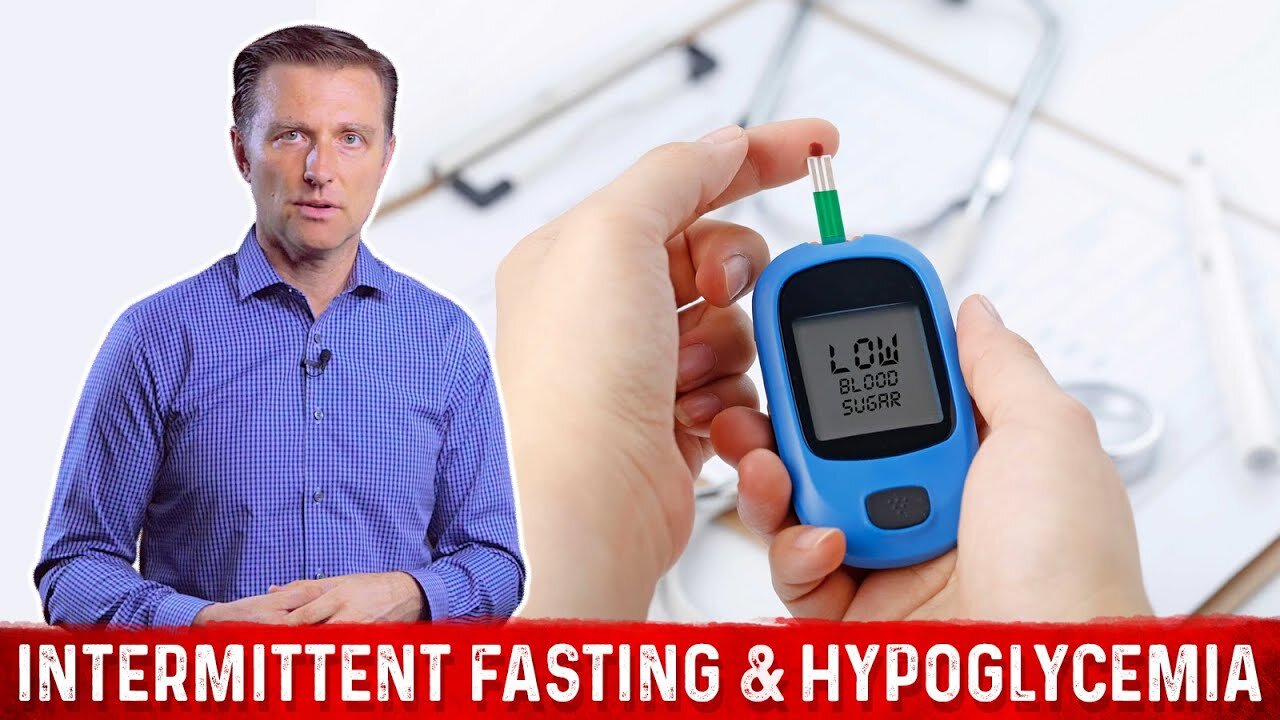Premium Only Content

Intermittent Fasting & Hypoglycemia Symptoms – Dr.Berg
This is why intermittent fasting is a powerful tool for hypoglycemia.
Talk to a Dr. Berg Keto Consultant today and get the help you need on your journey. Call 1-540-299-1556 with your questions about Keto, Intermittent Fasting or the use of Dr. Berg products. Consultants are available Monday through Friday from 8 am to 10 pm EST. Saturday & Sunday from 9 am to 6 pm EST. USA Only.
Add Your Success (Before & After): https://bit.ly/2O9C0HT
Take Dr. Berg's Advanced Evaluation Quiz: http://bit.ly/EvalQuiz
Your report will then be sent via email analyzing 104 potential symptoms, giving you a much deeper insight into the cause-effect relationship of your body issues. It's free and very enlightening.
Timestamps
0:00 Introduction: intermittent fasting and hypoglycemia
0:32 Symptoms of hypoglycemia
1:00 What causes hypoglycemia?
5:24 How intermittent fasting helps with low blood sugar
6:55 Final thoughts on intermittent fasting and hypoglycemia
In this video, we’re going to talk about intermittent fasting and hypoglycemia.
When your blood sugars are dangerously low, it’s important to normalize them as quickly as possible. However, what do you do for subclinical low blood sugar?
If you have hypoglycemia, you may experience the following symptoms:
• Headaches
• Excess hunger
• Fainting
• Fatigue
• Weakness
• Shakiness
• Irritability
• Nervousness
• Lightheadedness
Many people will say that the solution is to eat more sugar. Crazy, right? In fact, they often recommend having 14 to 25 grams of sugar. This is like recommending that an alcoholic drink tequila.
The problem IS the sugar. While a quick boost of sugar may act as a bandaid, it won’t address the underlying problem.
The underlying problem is too much insulin. Any time you have sugar or other types of carbohydrates, you spike your insulin level. Over time, this can cause insulin resistance and hypoglycemia.
When you develop insulin resistance, your insulin feedback loop breaks, causing your body to create way too much insulin.
Low cortisol can also cause high insulin and low blood sugar levels.
Another cause is low glycogen. Glycogen is stored carbohydrates. If you aren’t storing carbs/sugar properly, you can develop low blood sugar. Potassium is important for storing sugar properly. It’s important to replenish your electrolytes regularly with healthy vegetables.
The key to repairing insulin resistance is to do intermittent fasting. This is because your insulin level spikes each time you eat. Intermittent fasting reduces insulin spikes so that your insulin level stays normal throughout most of the day.
The first step is to give up sugar and refined carbs. Next, you want to ease into intermittent fasting slowly. Start by cutting out all snacks. Then have your first meal of the day later in the day. After that, you can cut out one meal and have two meals a day. And finally, you can go to one meal a day if you feel comfortable with it.
Dr. Eric Berg DC Bio:
Dr. Berg, age 55, is a chiropractor who specializes in Healthy Ketosis & Intermittent Fasting. He is the author of the best-selling book The Healthy Keto Plan, and is the Director of Dr. Berg Nutritionals. He no longer practices, but focuses on health education through social media.
Follow us on FACEBOOK: fb.me/DrEricBerg
Send a Message to his team: m.me/DrEricBerg
ABOUT DR. BERG: https://bit.ly/39LCWg8
Disclaimer: Dr. Eric Berg received his Doctor of Chiropractic degree from Palmer College of Chiropractic in 1988. His use of “doctor” or “Dr.” in relation to himself solely refers to that degree. Dr. Berg is a licensed chiropractor in Virginia, California, and Louisiana, but he no longer practices chiropractic in any state and does not see patients so he can focus on educating people as a full-time activity, yet he maintains an active license. This video is for general informational purposes only. It should not be used to self-diagnose and it is not a substitute for a medical exam, cure, treatment, diagnosis, and prescription or recommendation. It does not create a doctor-patient relationship between Dr. Berg and you. You should not make any change in your health regimen or diet before first consulting a physician and obtaining a medical exam, diagnosis, and recommendation. Always seek the advice of a physician or other qualified health provider with any questions you may have regarding a medical condition. The Health & Wellness, Dr. Berg Nutritionals and Dr. Eric Berg, D.C. are not liable or responsible for any advice, course of treatment, diagnosis or any other information, services or product you obtain through this video or site.
#keto #ketodiet #weightloss #ketosis
Thanks for watching. I hope this helped explain how to use intermittent fasting to help with hypoglycemia. I’ll see you in the next video.
-
 13:14
13:14
Dr. Eric Berg
5 days agoEgg Prices Are NOT by Accident
12.2K80 -
 2:56
2:56
Evade and Survive
3 years agoWhat is Intermittent Fasting?: explained
344 -
 13:03
13:03
Pam Popper
3 years agoIntermittent Fasting July 2021
6295 -
 7:46
7:46
UEvolveBuffalo
3 years ago $0.06 earnedIntermittent Fasting & HIIT Training
1771 -
 1:59:13
1:59:13
Adam Carolla
2 days agoBeing Republican & in Hollywood +Kelsey Grammer on Fatherhood + Peter Berg's Super Bowl Commercials
13.2K11 -
 18:29
18:29
DeVory Darkins
6 hours ago $12.06 earnedZelenskyy KICKED OUT of the White House after shouting match erupts
19.3K75 -
 2:23:02
2:23:02
Badlands Media
19 hours agoThe Liberty Den Ep. 133
59.8K19 -
 2:05:41
2:05:41
TimcastIRL
5 hours agoTrump SLAMS Ukraine President In TENSE WH Meeting, The War MAY END w/ Rob Smith | Timcast IRL
134K77 -
 10:31:05
10:31:05
Dr Disrespect
14 hours ago🔴LIVE - DR DISRESPECT - PGA TOUR 2K25 LAUNCH DAY
184K27 -
 2:30:04
2:30:04
Laura Loomer
5 hours agoEP105: MISSING: The Epstein Files
47.1K16